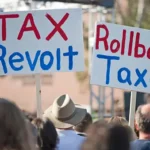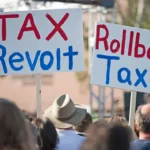Delving into the intricate world of tax protesting and exploring alternative perspectives is like navigating a labyrinth of fiscal complexities. This article unveils the intriguing landscape of tax protests and the myriad alternatives that have emerged. From passionate individuals questioning the system to unconventional methods challenging the status quo. Join me on a journey through the maze of dissent and innovative fiscal thinking, where the spotlight is on those who dare to challenge the conventional notions of taxation.
What Are Taxes?
Taxes, the foundation of modern governance, form a nuanced and complex system that profoundly influences the socio-economic fabric of societies. At its essence, taxation is a mandatory financial mechanism employed by governments to extract contributions from individuals, businesses, and properties. These financial tributes, in turn, serve as the lifeblood of an array of public services. These services include education, healthcare, infrastructure, defense, and various other facets crucial for social well-being.

The taxonomy of taxes is broad and multifaceted, reflecting a nation’s diverse needs and priorities. Among the prominent types are income taxes. This directly taps into the earnings of individuals and corporations, ensuring an equal contribution based on financial capacity. This method aims for a form of fiscal equity, sharing the burden according to one’s ability to pay.
Additionally, consumption-based taxes, such as sales and value-added taxes, pivot on expenditure, shaping economic behavior and contributing to revenue streams. On the other hand, property taxes are rooted in real estate ownership. They provide a sustainable source for local government funding and community development.
The nature of taxation extends beyond its types, encapsulating a web of legislation, economic policies, and social dynamics. Tax codes outline the rules and regulations governing the collection and distribution of funds. They are often complex and subject to amendments. Economic policies interlace with taxation, aiming to strike a delicate balance between encouraging growth, mitigating inequalities, and ensuring fiscal responsibility.
Societal needs and expectations play a pivotal role in shaping the tax landscape. Public discourse on the sharing of funds highlights the democratic nature of taxation, where peoples’ voices influence budgetary decisions. In response to changing priorities and challenges, governments adapt tax policies to address issues such as climate change, health crises, or economic differences.
Texas and Taxes
Texas, known for its independent spirit, boasts a unique approach to taxation that significantly influences residents, businesses, and the overall economic trajectory. Unlike many other states, Texas proudly stands as one of the few without a state income tax. This unique feature contributes to the state’s appeal, attracting individuals and corporations seeking a tax-friendly environment. However, the absence of a state income tax prompts a heavy dependence on other revenue sources, such as property and sales taxes.
Property taxes, a cornerstone of Texan fiscal policy, fund local services and education. The revenue generated plays a crucial role in maintaining infrastructure, supporting public schools, and financing essential community services. Texans often find themselves engaged in discussions about the balance between property tax rates and the need for adequate public funding.
Sales tax, another integral component, is woven into the fabric of everyday transactions. As consumers make purchases, a percentage of the transaction contributes to state and local coffers, fueling government initiatives and public projects. Understanding the intricacies of sales tax is key for businesses and individuals alike, influencing spending patterns and budget considerations.
Moreover, the significance of taxes in Texas extends beyond revenue generation. They serve as a mechanism for funding vital public services, including healthcare, transportation, and law enforcement. The ebb and flow of tax policies directly impact the quality of life for Texans, shaping the accessibility and quality of essential services.
Tax Protesting In Texas
Venturing into the nuanced arena of tax protesting opens the door to myriad perspectives and complexities. It is a dynamic realm where individuals voice their dissent or opposition to various facets of the taxation system. In the expansive landscape of Texas, this phenomenon takes on a unique character, intricately woven with the state’s unique tax policies, socio-economic dynamics, and the diverse motivations that propel individuals into the realm of tax protest.

Tax protesting in Texas is not a mere act of defiance; it’s a complex interplay of legal frameworks, historical context, and individual beliefs. Understanding the intricacies requires peeling back the layers to reveal the multifaceted nature of this civic expression. The legal landscape in Texas provides a fascinating backdrop, with specific statutes governing taxation and avenues for citizens to voice their concerns.
Motivations for tax protests in Texas vary widely. Some individuals may be driven by a genuine belief that the current tax system is inequitable or burdensome. In contrast, others may see it as an opportunity to challenge the status quo and advocate for systemic change. Economic differences, regional variations, and demographic factors further contribute to the diverse tapestry of motivations that underpin tax protesting in the state.
Exploring the historical context of tax protests in Texas unveils a legacy of civic engagement. It also shows the evolution of dissent in response to changing economic and social landscapes. From iconic moments that have shaped the state’s tax policies to grassroots movements advocating for reform, understanding the historical underpinnings provides valuable insights into the roots of contemporary tax protests.
Alternatives To Tax Protesting In Texas
Navigating the multifaceted realm of taxation in Texas requires a comprehensive exploration of alternative avenues. Rather than embarking on the intricate and potentially legally fraught path of tax protesting, individuals and businesses can strategically navigate the tax landscape through a variety of avenues that optimize financial outcomes.
1. Tax Credits and Deductions:
Delve into the extensive array of tax credits and deductions available in the state of Texas. From education-related credits to incentives for energy-efficient home improvements, understanding and leveraging these opportunities can significantly reduce your overall tax liability. Thorough research into the eligibility criteria and documentation requirements is essential for maximizing these benefits.
2. Business Tax Strategies:
Entrepreneurs and business owners can explore tax-friendly structures. These include Limited Liability Companies (LLCs) or S Corporations to optimize their tax situations. A nuanced understanding of Texas-specific business tax laws is crucial for maximizing benefits and ensuring compliance with the regulatory landscape.
3. Charitable Contributions:
Redirecting resources towards charitable endeavors contributes positively to the community and provides potential tax benefits. Familiarize yourself with eligible charities and ensure meticulous record-keeping to claim deductions on your contributions. This step aligns philanthropy with strategic financial planning.
4. Tax-Advantaged Investments:
Dive into tax-advantaged investment opportunities such as 401(k)s, Individual Retirement Accounts (IRAs), and Health Savings Accounts (HSAs). These investment vehicles secure your financial future and offer tax benefits, providing a strategic and efficient means of growing wealth.
5. Real Estate Strategies:

Given the diversity of the Texan real estate market, individuals can explore tax-efficient real estate investments. A comprehensive understanding of property tax laws and strategic approaches like 1031 exchanges can optimize real estate holdings while minimizing tax implications.
6. State-Specific Incentives:
Stay abreast of Texas-specific tax incentives and exemptions tailored to various industries. Whether in agriculture, energy, or technology, the state often provides targeted incentives to encourage specific sectors, presenting opportunities for businesses and individuals to align their activities with these incentives.
Individuals and businesses can intelligently navigate the Texan tax landscape by adopting a proactive and strategic approach through these alternatives. This ensures financial stability and growth without resorting to the complexities and potential legal ramifications associated with tax protesting.
What is the role of taxes beyond revenue generation in Texas?
Taxes in Texas serve as a mechanism for funding vital public services, including healthcare, transportation, and law enforcement. The ebb and flow of tax policies directly impact the quality of life for Texans, shaping the accessibility and quality of essential services.
What motivates tax protests in Texas?
Motivations for tax protests in Texas vary widely. Some individuals are driven by a genuine belief that the current tax system is inequitable or burdensome, while others see it as an opportunity to challenge the status quo and advocate for systemic change. Economic disparities, regional variations, and demographic factors contribute to the diverse motivations.
How does the legal landscape in Texas influence tax protests?
The legal landscape in Texas provides a fascinating backdrop to tax protests, with specific statutes governing taxation and avenues for citizens to voice their concerns. Understanding these legal frameworks is crucial for anyone navigating the complexities of tax protests.
What are the alternatives to tax protesting discussed in the article?
The article suggests various alternatives to tax protesting, including exploring tax credits and deductions, employing strategic business tax structures, redirecting resources towards charitable contributions, engaging in tax-advantaged investments, adopting tax-efficient real estate strategies, and staying informed about state-specific incentives tailored to various industries.
How can individuals and businesses navigate the Texan tax landscape proactively?
Adopting a proactive approach involves understanding and leveraging available tax credits, exploring tax-friendly business structures, making strategic charitable contributions, engaging in tax-advantaged investments, optimizing real estate strategies, and staying informed about state-specific incentives to align activities accordingly. This ensures financial stability and growth without resorting to the complexities of tax protesting.
Oluwatukesi Joseph is a Content Writer at LOBF. He holds a Master’s Degree from Obafemi Awolowo University in Architecture, However, his love for writing and content creation has transitioned him into the writing and content marketing field. He has gained relevant certification from other notable Universities where he developed a strong foundation in content marketing and writing.
Outside of work, Joseph enjoys spending quality time with friends and family and playing chess, which he finds often complements his professional pursuits. Joseph is excited to be part of the dynamic team at The Law Office of Bryan Fagan, contributing his expertise to spreading the good news of LOBF to Families across Texas.




